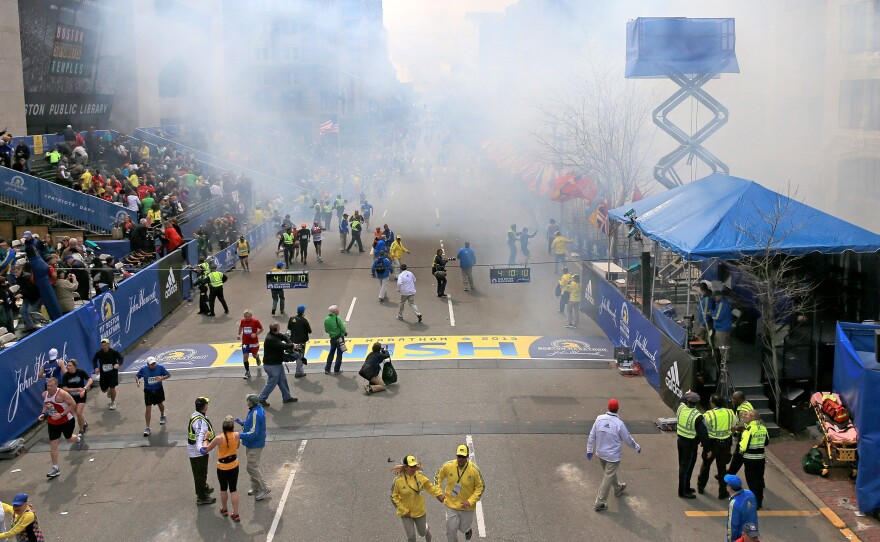
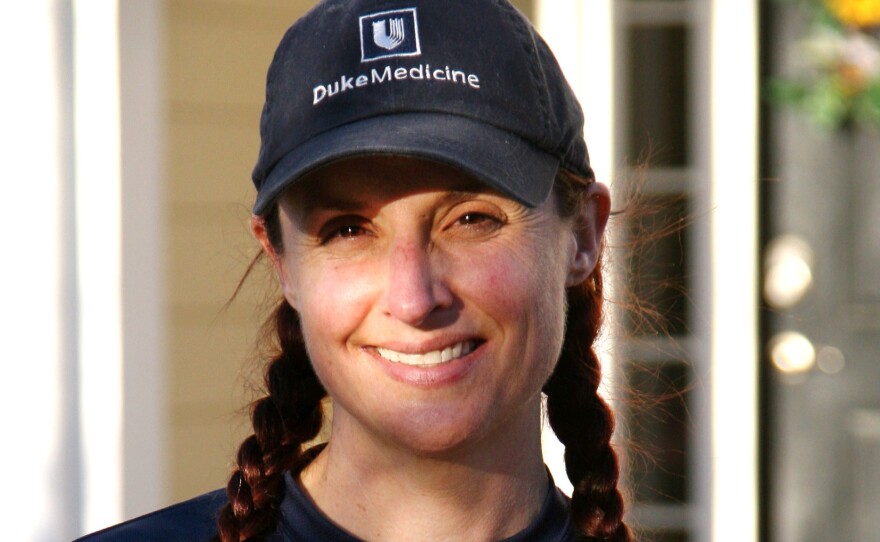
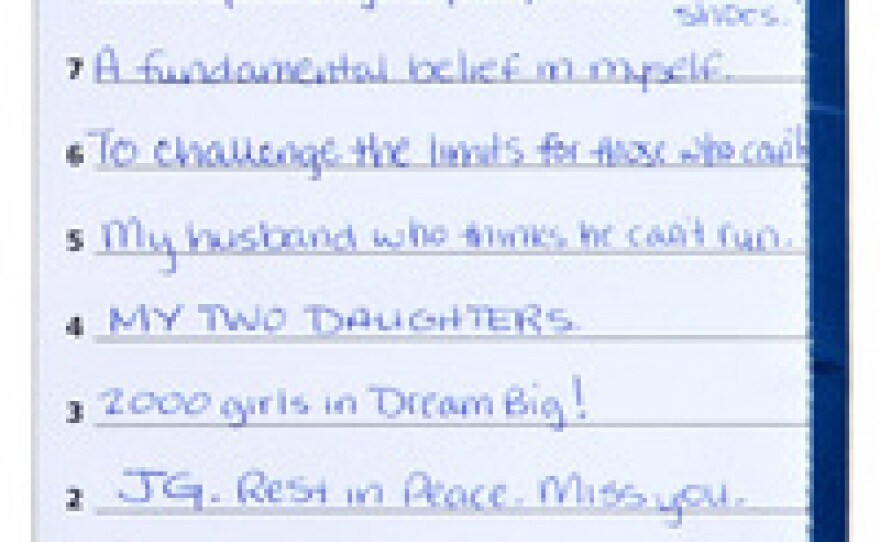
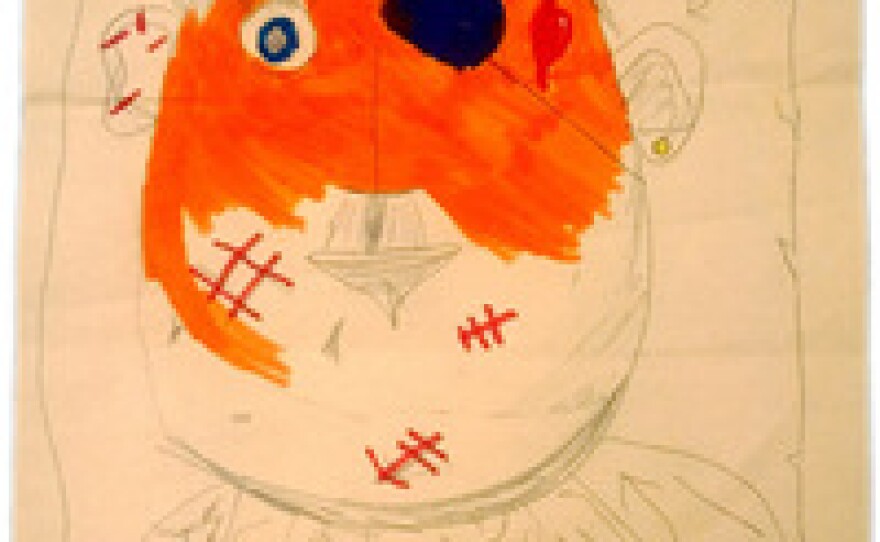
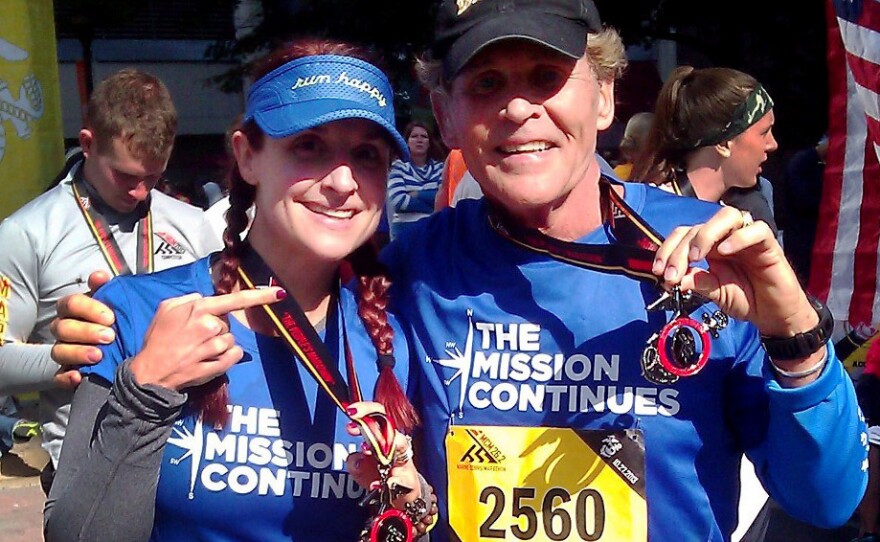
Eight runners entered in the 2014 Boston Marathon are documenting their race preparations for NPR in a Tumblr blog. Demi Clark is one of the eight, and this is her story.
Demi Clark was having a storybook Boston Marathon experience when the first blast sounded out like a cannon behind her. Just feet from the finish line on Boylston Street and still running, she saw a look of horror sweep over the face of a race official in front of her and turned to see what had happened. Debris and runners littered the course while smoke and sulfur filled the air.
Up until that moment, everything had been like a dream. Demi's family had been in the Boston area sightseeing ahead of the April 15 race, geeking out on history at spots like Plymouth Rock. Her husband and two daughters, ages 7 and 9, had seats for the race in a VIP grandstand near the finish line, the result of Demi's success at raising money for her charity sponsor. And the race itself had gone well — her third marathon was her best yet.
When the second bomb went off, she realized "we're under attack" and went into survival mode. Momentum had carried her across the finish line — she was one of the last to record a race time — and officials tried to stop her from turning back up the course, toward the explosions, to reach Brian, Maizie and Willa. She had only one thought in her head as they tried to get her to move along into the finish-area chute.
"The stands are going to go up next. My children and my husband are there. I have to get them out of here."
Demi Clark would not have been in Boston for last year's fateful race if not for a dare. She told me the story of her surprise conversion to marathon running when we met recently near her home in the Charleston, S.C., suburb of Mount Pleasant.
Back in 2010, Demi had her own public relations business and worked closely with the NASCAR community. An unusual event at a track in South Africa put her in position to pick up another client: British race car driver John Mickel. But there was a catch. She had to run the London Marathon with him to seal the deal.
That was asking a lot. Up to that point, Demi had never even run a 5K (3.1 mile) race. Motivated by ambition and a naturally competitive spirit, she went from 0 to running 26.2 miles in just 16 weeks of training. Always an athletic type, she was hooked. The London Marathon opened her up to the joys of distance running: the time to think, to work things out in your own head and to see the world around you in a new light (often the light of dawn!).
A year later she ran a tough marathon in Nashville, Tenn., and then pulled back to focus on half-marathons. The opportunity to run Boston 2013 and return to marathoning came via a charity team supporting a Boston group called Dream Big that helps underprivileged girls get involved in sports. Having already volunteered at home as a Girls on the Run coach, Demi identified with the mission and committed to running the 117th Boston Marathon.
But there's really more to her accidental passion for marathon running than a chance dare from a potential client. You could say that Demi's path to Boston was laid when Jason George, a family friend she described as being like another big brother, was killed while serving in Iraq.
JG, as she called him, had graduated with her brother Spencer from West Point in 1994. A happy-go-lucky man in an all-too-serious world, JG set the example for everyone around him with boundless humor and generosity of spirit.
He didn't need to be in Iraq. JG had voluntarily re-entered the Army after a stint in the private sector. He was in Iraq to help others when a suicide bomber cut his life short.
His death on Memorial Day 2009 sent Demi into hysterics. But it ultimately turned her life in a new direction: "That's when I started giving back to other people and realizing the impact that we can have as individuals."
It has motivated her to live in the moment, to take charge of her own destiny. She started her own business, and it's that step that took her to South Africa and London. Without making that leap, Demi would likely never haven been in Boston on April 15, 2013.
"That's my family. I've got to get to them. I'm getting them out of here, I promise."
Demi pleaded with race officials to let her run back up the course to the VIP stands where her husband and daughters had been watching the race as the bombs went off, one of the explosions directly across from their seats. She sprinted to them as her husband Brian grabbed one kid under each arm and headed out of the stands.
"Everyone freaking out and here's my husband in the middle of it standing with a kid under each arm like a sack of potatoes. He took over at that moment. That's when I had my first physical release. He was officially, at that moment, a parent of three children; my body started giving up."
Reunited and with Brian leading the way, they walked back to their hotel in shock. As they wandered the streets, a stranger spotted them, recognized their distress and took them in to eat, rest and make phone calls. That night no one slept. While Demi did interviews with media from across the globe, none of them could really process what had happened. On TV they could see Maizie's backpack left behind in the bleachers by the course, now a crime scene.
The day after, on the advice of a trauma counselor, Demi and Brian took their daughters to the aquarium. It seemed counterintuitive to the family. But the trick worked, as Maizie and Willa were able to run free and act like kids in the face of an unexplainable tragedy.
Neighbors and friends embraced the family on their return to Fort Mill, S.C. Active-duty servicemen Demi had worked with as a volunteer told her she had been in what they would call a "trigger incident" and that she needed to look forward. "So what; now what?" they counseled. The police in Boston returned Maizie's backpack a few weeks after they got home.
Still, the underlying trauma wouldn't go away. Neither would the prying, ghoulish questions stop, people wanting to know exactly what they had seen (too much) that day in Boston when three people had been killed and hundreds wounded.
When a job opportunity presented itself not long after Boston, Demi grabbed it and didn't look back. In July, she moved her family from the Charlotte area, their home for nine years, to Mount Pleasant on the South Carolina coast, a new town that offered the peace that comes with anonymity.
The fit was perfect; life was good. But Boston was still a sore spot.
"I didn't know if I wanted to go back to Boston. It was like: Let's go on a cruise somewhere, so I can be on the other side of the world, so that I don't have to do an interview, I don't have to face it. It's not part of my healing journey. It is for other people — and I respect that — but not mine!"
The feelings ran deep. When a slew of September interview requests rolled in, Demi sobbed to her mother: "I feel like I'm letting down so many people if I don't go back there and run. I'm not #bostonstrong, whatever that is. I don't want to go anywhere near there."
But the tide began to turn in October when Demi paced her 68-year-old father, Howard Kympton, in his first-ever marathon, the Marine Corps in Washington, D.C. They both ran in support of her brother Spencer's veteran-focused charity The Mission Continues. She was running again. She was inspiring and helping others again. The door to Boston 2014 cracked open.
Maizie, wise beyond her 9 years, kicked it the rest of the way when she said, "Mommy, do you want to go back there? If you don't, that's OK. If you do, please do it for yourself."
Demi recalled her reaction: "My shoulders just instantly came away from my ears, like, 'it's OK either way.' And then it just kind of came to me that this was going to be good for me and that I needed to turn around and stare this in the face."
When asked if they wanted to return to Boston themselves, Maizie and Willa said they'd rather not. But their mother will be there, representing.
"I really want to be an inspiration to anyone who has had to overcome anything: loss of any kind, fear, doubt. We've all had something in our lives that we've had to overcome. This is just a 'keep digging' moment; chin up!"
Copyright 2014 NPR. To see more, visit http://www.npr.org/






